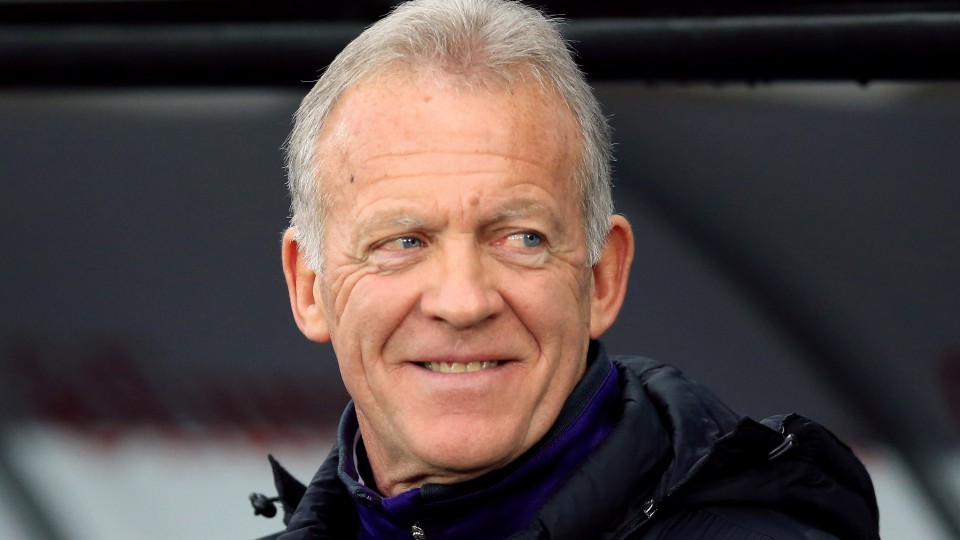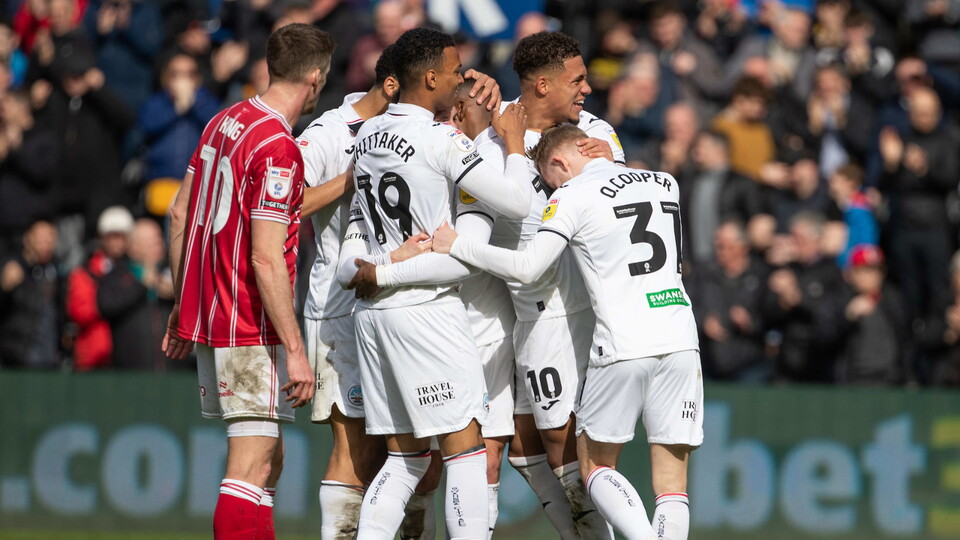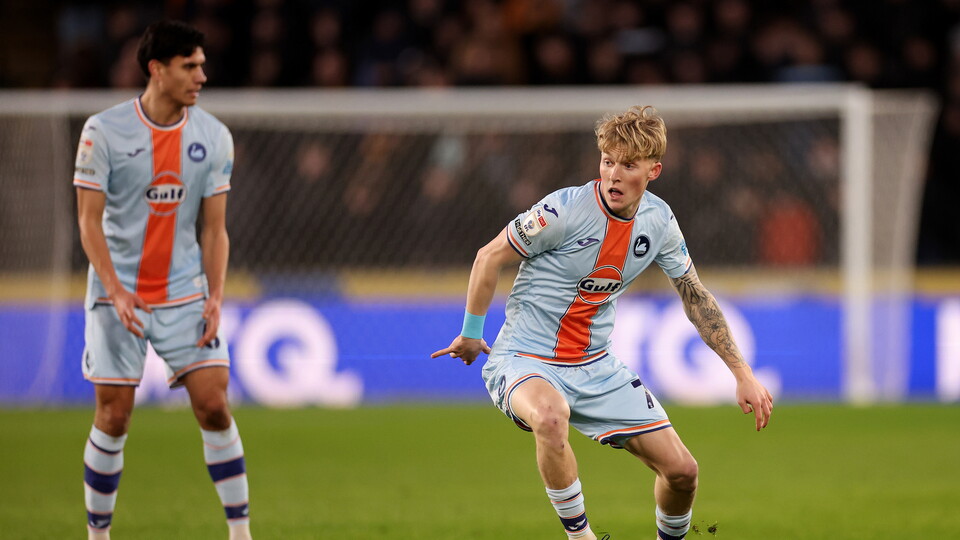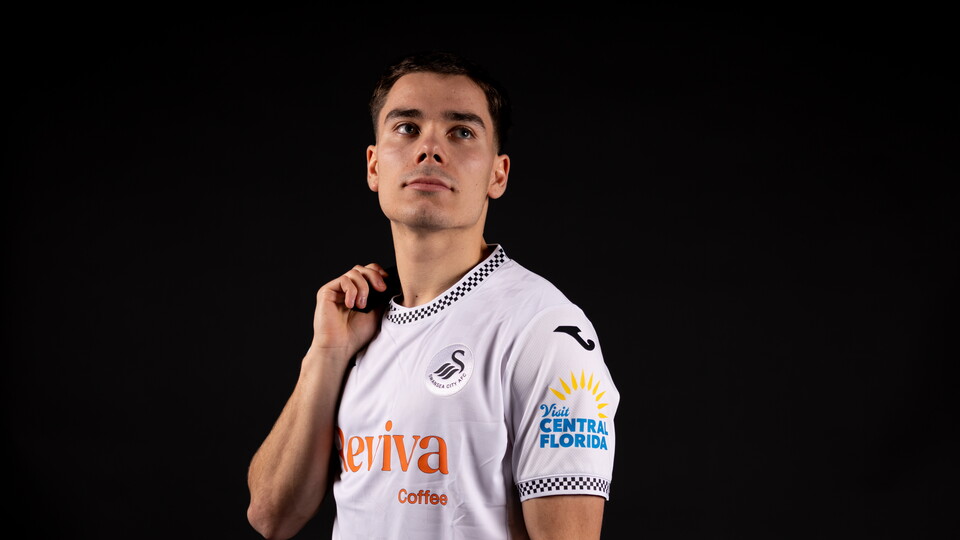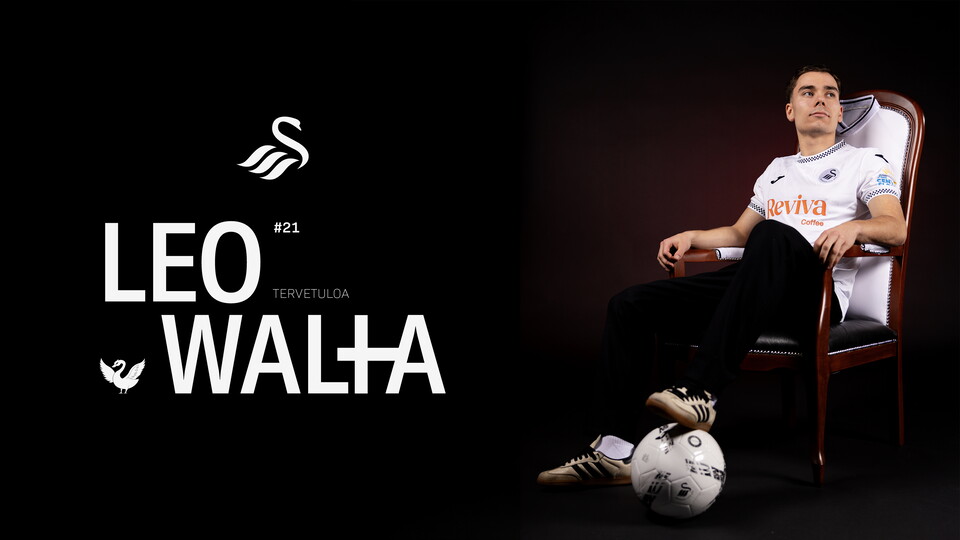Curtis calls time on a classic career
“It’s not about the opposition you play, it’s about the club you play for.”
For a man who spoke with his heart in so many pivotal pre-match team talks over the years, Alan Curtis gives one more big speech to his peers.
On his 65th birthday, he announces he is retiring from first-team coaching at the end of the season, and there is barely a dry eye around Fairwood Training Ground as Curt tells players, coaching colleagues and office staff of his decision to call time on a fabulous career at Swansea City.
There are more than one reason why Curt is known by all around the club as “legend”.
Not only for his unbelievable quality as a footballer, or his service to the club over 40 years, but perhaps more importantly for the person he is.
His dropped shoulder and rocket into the top corner on that famous opening-day First Division win over Leeds will forever be remembered.
And so will the part he played in helping the Swans rise from the Fourth Division to the top.
There are the legendary, stirring team talks he gave before the games with Rochdale and Hull to preserve the club’s Football League status.
But it his personality and presence around the football club and city which will always remain top of the list.
His love affair with the Swans begun when his uncle Roy Paul captained the team – it is a partnership which has now seen him serve the club for over 40 years.
As a player, he scored 110 goals in over 400 appearances during three separate spells with the Swans.
When he hung up his boots, his roles varied from a community officer, youth coach, first-team coach, assistant manager, caretaker manager, match day host, head of youth development and, prior to his current role, the club’s first loan player manager.
He can now add another new title to his list, with Curtis set to take up the Honorary Club President position - last held by Gwilym Joseph MBE, who sadly passed away in August 2017 – this summer.
While his service has been unrivalled and of the highest quality, Curtis concedes it is the right time to call time on his football commitments.
“It was a difficult decision, and in many ways it was an easy one too,” says Curtis.
“Announcing it on my 65th birthday was the right time to do it. It’s very much a young’s man game and I feel the time is right.
“I knew when I was playing that the time was right to finish, and I feel the same now. My coaching days are coming to an end.
“I’ve had a fantastic time and now it’s time for the younger coaches to step up. I’ve not doubt that whoever comes in to replace me will do a fantastic job in a great football club.
“I will miss it but I am looking forward to it and have a lie-in on a Sunday morning instead of going into training.
“I am certainly looking forward to Christmas Day when I won’t have to report for training with the rest of the staff and team.”
Following in his uncle’s footsteps, Curtis joined the Swans as a professional aged 18 after impressing in a successful trial match between Mid Glamorgan versus West Glamorgan
After completing his A Levels in economics and history, the classroom was ditched for the changing room as Curtis took in his first pre-season with the first team.
And so came the first sight of Curtis gracing the Swans shirt, even though they got off to a bumpy start.
“We were relegated in my first season – I didn’t play much of a part that year - and then Harry Griffiths took over and he was the catalyst just like Roberto Martinez was for changing things around.
“Harry talked about the Swansea Way back then, and we had local lads coming through like Robbie James, Jeremy Charles, Nigel Stevenson, Wyndham Evans and myself.
“He encouraged us to play football and we revelled in it.
“I played with no fear but it was a big learning curve in professional football. You can’t prepare for the physical side of things.
“I look back at those days with great affection because I met some great characters and it prepared for me for the rest of my career.”
Then came the spark which kickstarted an unforgettable journey in the club’s history with the arrival of John Toshack as player-manager.
From Fourth to Third to Second to First Division – the Swans climbed up the ranks in rapid time.
It was a period in which Curtis would describe as the best time of his playing career.
“Tosh came in and the club went through the roof. Harry was the catalyst but Tosh took it on to the top,” adds Curtis.
“The first time Tosh walked in as manager I didn’t know whether to call him Tosh or boss, so it ended up being Bosh!
“In his first talk he said we would be in the First Division in a few years. There were a few eyebrows raised, but when he started working with us there was an injection in belief.”
Curtis had played a key role in that rise, though his service was broken by a one-year spell at Leeds United for the 1979-80 campaign.
But his magical swerve, which left many a full-back mesmerised, would grace the top flight in a Swans shirt as Toshack’s men made a brave fight for the league title.
His time as a Swan ended shortly after the club’s exit from the top flight, with Curtis sold to Southampton.
Spells with Stoke City – on loan – and Cardiff City followed before returning to the Vetch for a final swansong.
After a sparkling career, it was only fitting that Curtis begun his new career where he had started it as a player.
“I played my last season for the Swans when I was 36 years of age in 1990,” he explains. “I worked for an insurance company for just under a year and then the Football In The Community scheme had just been set up at the club. So, I became the first Football In The Community Officer at the Swans.
“It was a new project at the time. Frank Burrows was the manager at the time, and he explained that it was about going into local schools and taking the football club into the community.
“We started a big schools programme, and ran employment sessions and other sessions for people with learning difficulties.
“It was an important job but it was a huge amount of fun as well. It was very important that we raised the profile of the club.
“I went to Swansea Prison every Wednesday to play football with some of the inmates. It was funny when the ball flew over the wall because the inmates were arguing over who would get the ball back!
“There was only myself doing it in those days so I’d take all the bookings and ensure we had all the balls and bibs for sessions.
“It also allowed me to coach some youngsters and that was great preparation because I went into coaching the youth team and then the reserve side.
“It gave me a good grounding for the first team. It wasn’t easy then, however, as we’d be ringing Ashleigh Road on a Monday morning to see if we could have a pitch to train on.
“If we were turned down there, and if the same happened at another venue then we’d be checking the tide times to see if we could train at the beach. We’d have ten footballs for the season, so if we lost one then we’d spend the rest of the day looking for it!”
He continued to rise the ranks on the coaching ladder at the club, and he would soon be a key figure in the first-team staff.
If there was anyone who needed a reminder of what this club meant to the city, they needed to look no further than Curtis.
His stirring rallying calls before the crucial games at Rochdale and at home to Hull in 2003 have been etched into the club’s history books.
Even today, he speaks with such emotion on what he told Brian Flynn’s men on those days.
“We had two games left – Rochdale away and Hull at home – and had to win them both,” he recalls.
“We tried to shield the players from the pressure, but there comes a time when they have to face the reality of the task in hand.
“I spoke to physio Richard Evans, who is now with Roberto Martinez in the Belgium set up, about speaking to the players and telling them what it means to everyone.
“So I told them what it means to the city and the fans. Roger Freestone was a fantastic servant and was in his testimonial year, so I spoke about how important it was that we were a league club at the end of his testimonial game.
“Richard’s dad Brian, who played for the club, said before he sadly passed away that we had to make sure the club stayed up, so I told the players that.
“I told them that they were the most important players in the club’s history, and they reacted with a win which set us up for the Hull game.
“I have never been as nervous as I was during the Hull match. Everything was on the line.”
Curtis’ pre-match words again came up trumps as the Swans saw off Hull 4-2 thanks to James Thomas’ hat-trick and Lenny Johnrose’ goal.
Then it was time for a similar journey which Curtis had experienced as a player as the Swans rose up the ranks once more.
“They were fantastic times,” he beams. “We had escaped relegation from the Football League by the skin of our teeth, then it was a case of building.
“Kenny Jackett got the club out of League Two, and then Roberto’s appointment was the catalyst for big change in the football club.
“He wanted to do it differently to everyone else, and it suited us.
“We stormed to the League One title and really adapted to the Championship.
“Then, after Paulo Sousa took us close to the play-offs, Brendan Rodgers really took the club onto a new level.
“Getting promoted to the Premier League was so special. As a player I had been part of a team that got to the First Division for the first time, then as a coach I was part of the team that was promoted to the Premier League for the first time.”
Curtis would go on to work under Michael Laudrup as the club clinched its first piece of major silverware in 2013 followed by a Europa League adventure.
After Monk’s exit, Curtis worked under former club captain Garry Monk, Francesco Guidolin and Bob Bradley while taking the reins as caretaker-manager when required.
Then he would take up a new role as the Swans’ first loan player manager before returning to the first-team fold last summer to become part of Graham Potter’s coaching staff.
It is a position which he has thoroughly enjoyed. And, after watching the team grow this year, he is looking forward to seeing what the future holds for the current crop.
“It has been a privilege to be part of the current set up,” he adds with a smile. “To see the youngsters coming through has been superb.
“As loan player manager I was watching Connor Roberts at Middlesbrough; Daniel James at Shrewsbury – though he didn’t get a game – along with Joe Rodon at Cheltenham and Oli McBurnie was with Barnsley. Matt Grimes also played a load of games with Northampton.
“Now I am seeing them develop in the first team, which is very satisfying. Matt has spent the last few years outside of this club but has really come along under Graham’s guidance.
“They have formed a really exciting team and I would liken the style of football to what we played under Roberto, Brendan and Michael. There is no bigger complement than that.
“Graham is doing a great job with this team and I am looking forward to seeing how this team develops. He will be instrumental in how successful we can be at this club.
“If we can keep this team together then the future looks really bright.”
Curt on. . . football in the family
My father had the opportunity to sign for Leicester City – football wasn’t regarded as a proper job in those days - so he worked down the mines and ended up as a college lecturer.
My uncle, Roy Paul, was a massive influence on me. He captained the Swans and then Manchester City in two FA Cup finals, so football was always a huge pull for me.
When I was growing up I was Alan Curtis – nephew of Roy Paul. I was very proud of what he achieved.
Being from Rhondda, I obviously played a lot of rugby at school level. It came to a point when rugby and football clashed, and it was always going to be football for me.
Curt on. . . becoming a Swan
I could have signed for the club when I was 17, but I was in Porth County Grammar School and I’d completed the first year of sixth form so I was doing my A Levels in Economics and History. I studied them because they had football teaches in charge of the subjects.
I played for Mid Glamorgan versus West Glamorgan, who had a lot of Swansea schoolboys in the team.
Jeff Ford, who was the chief scout for the club at the time, invited me down for trials. I could have signed pro terms at 17, but my father wanted me to complete my A Levels so I signed at 18.
It was straight into pre-season training after that as a professional footballer.
Curt on. . . that day in Preston
The papers reported there was around 10,000 Swans fans at the Preston game, but I must have talked to about 20,000 who said they were there!
We knew we had to win otherwise Blackburn could go up, so it was a massive game.
It was a huge responsibility because the club had never been in the top division before.
When we went onto the pitch we just knew we were going to win. It was not just our dreams, but the dreams of our city as well.
Curt on. . . stunning Leeds
The best games in my career came against Preston and Leeds.
I’d not had the best of times at Leeds, so to come back to Swansea and score in the opening game against them was special for me.
We led the table at some points during that season, and in hindsight, we could have won it.
But the period of going from the Fourth Division to the First Division was the best time of my career. It was a fantastic journey.
Curt on. . . the evolution version 2.0
Roberto was the catalyst for the football and the team we became.
Brendan was superb – he took it onto another level.
We all remember our days at Wembley, but we should point out how important the games against Nottingham Forest were in the play-offs.
It was impossible for us to lose the final at Wembley – we couldn’t come back to Swansea if we had lost.
We always seemed to find a way of winning games back then, and the celebrations on the open top bus were something I’ll never forget.
Then, when Michael came in, we went up a notch again and won the League Cup – the first piece of major silverware in the club’s history.
They were great days.
Curt on. . . the caretaker-manager role
If you become a caretaker manager then it usually means a manager has unfortunately been sacked.
I took over in the lower leagues but being caretaker in the Premier League was fantastic.
The game against Arsenal is one that stands out. We had been beaten by Spurs prior to that, and then Francesco was taken ill so I stepped in.
At that time, when the club needed to find a big result we did just that.
We had big internationals in that team – Lukasz Fabianski, Ashley Williams, Federico Fernandez, Gylfi Sigurdsson, Bafe Gomis, Jonjo Shelvey, Wilfried Bony – so there was no reason why we couldn’t go there and win. We did win 2-1, and then we beat Norwich in the following game.
Francesco returned and we finished the season strongly.
Curt on. . . becoming Honorary Club President
It is a tremendous honour and wasn’t something I saw coming.
I will be retiring but I will have a part to play in the club. The club doesn’t give this role out lightly, so I am very honoured.
